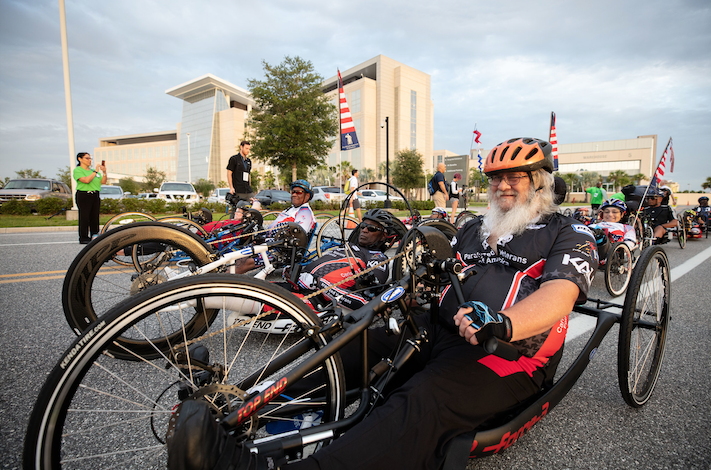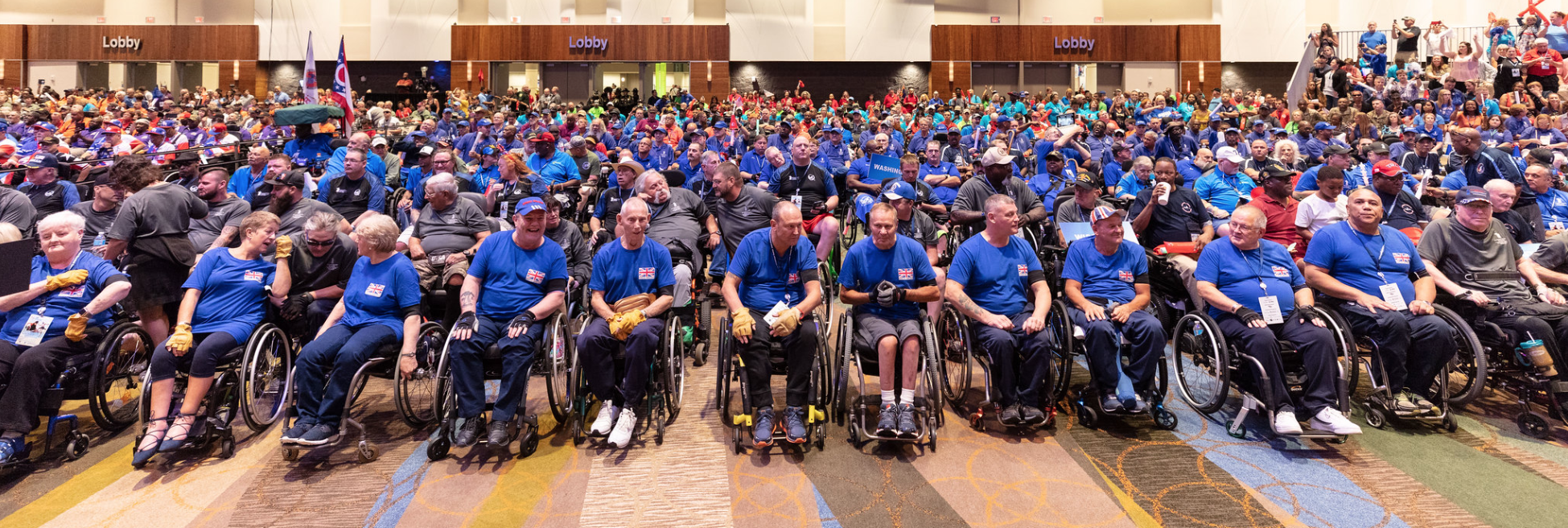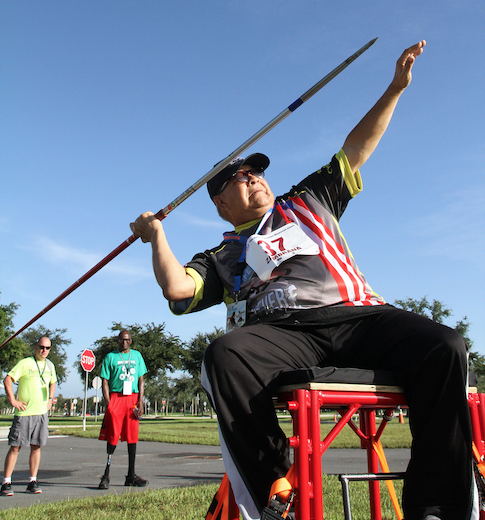Writer / Christy Heitger-Ewing
Each year the National Veterans Wheelchair Games (NVWG) is co-presented between the Department of Veterans Affairs (VA) and Paralyzed Veterans of America (PVA). The games serve veterans with spinal cord injuries, multiple sclerosis, amputations and other neurological impairments that require the individual to use wheelchairs or adaptive equipment for sports and recreation.
“The games reflect the VA and PVA’s rehabilitation commitment to inspire and empower veterans with physical disabilities to lead more active lives through sports,” says Dave Tostenrude, Director of NVWG.
This year the NVWG are coming to Louisville between July 11-16 as the Robley Rex VA Medical Center is cohosting the games with the Kentucky-Indiana Chapter of the Paralyzed Veterans of America (KIPVA). Free and open to the public to spectate, this is the 39th year for the games. According to Tostenrude, the games are a rehabilitation event at its core given that approximately 25% of the veterans who attend are being active through VA rehabilitation programs or through the PVA’s chapters across the country.
“We’re using adaptive sports as a tool to get people living healthy lives,” says Tostenrude, who has been working for the VA since 1990, starting first as a recreational therapist specializing in spinal cord injury rehabilitation in Seattle. He then served as a coach for 12 years before moving into an administrative role within the VA. In 2012, when the long-term founder and director of the games retired, Tostenrude says he “won the lottery and was selected as the new director.”
This year organizers are anticipating more than 600 veterans to come to Louisville. According to Vickie Lincks, Executive Director of KIPVA, 23 of those athletes hail from Kentucky and Indiana. They are also expecting a record number of novices (newly injured or new to the program) to participate — 170 are already registered. The games introduce novices to a larger community that many didn’t even know existed. And it works both ways as two-thirds of the veterans who return each year do so because they want to inspire the novices.
“There’s nothing out there like it,” Tostenrude says.
Besides the 600 veterans, another 150-200 caregivers and staff will work the event, not counting the hundreds of sponsors and thousands of volunteers. According to Heather Harding, the local [Louisville] Organizing Chair of the 39th NVWG, it takes between 2,500 to 4,500 volunteers working in various capacities throughout the week to put on this massive event.
The program, which follows a Paralympic model, includes 20 different events ranging from basketball, boccia, and bowling to track, trapshooting and table tennis. There’s also swimming, softball, cycling, powerlifting and power soccer, as well as archery, air guns, quad rugby and a golf scramble. Then there’s the ever-popular wheelchair obstacle course called the slalom, a test of agility, strength, skill and speed.
“We offer pretty much the entire spectrum of adaptive sports,” says Tostenrude, noting that they’ve had a number of veterans who have been exposed to wheelchair sports at the NVWG and have gone on to win gold medals at Paralympic competitions.
Athletes are encouraged to participate in up to five events as long as their physician has cleared them to do so. Each year the NVWG move to a new community so that veterans can not only visit different cities but also practice navigating outside their comfort zone.
“By traveling to other cities, they have to transition their care away from their home community where they’re secure,” Tostenrude says. “They become more independent because traveling in a wheelchair can be really challenging and that’s part of the experience.”
In addition, having different cities host enables the VA and PVA to expose communities to greater opportunities to support veteran services. For instance, this year during the week of the games, there’s a giant music festival happening in Louisville.
“It’s kind of hard for the Louisville community not to see 600 people rolling around, competing, and having a great time,” says Tostenrude. “It’s great exposure for people to support programs for the disabled community.”
The main hub for the NVWG will be at the Kentucky International Convention Center though they will also utilize a variety of outdoor venues as well. For instance, cycling will be held at Beckley Creek Park. Field events will be at Pope Lick Park. Jeffersonville High School will host the track events. The sports festival/team challenge will be at Belvedere Park. And the athlete reception, as well as the slalom/Super G will be at Fourth Street Live.
The Super G is a head-to-head timed obstacle course competition between two athletes who have the same level of injury. UPS, a national sponsor for the event, has stepped up to make the experience unforgettable for the veterans. For example, they’re bringing in some of their souped-up vehicles to stage in the area. They’re also building a platform to cover the entire street. The Super G, held at the end of the week, is a hallmark event that Tostenrude describes as “American Ninja Warrior on steroids but in a wheelchair.”
“They’ll put the athletes four feet in the air on railroad ties and they have to traverse that in their wheelchair. We’re going to have them climb a climbing wall in their wheelchairs,” Harding says. “It’s amazing to watch these wheelchaired athletes go through an obstacle course that a lot of us probably couldn’t do ourselves.”
After 26 years of working with the games, Tostenrude still gets choked up during opening ceremonies.
“When the novices come into the opening ceremonies and recognize that they’re part of a larger community, there are tears all around, not only from the veterans but from everyone watching,” Tostenrude says.
Injured veterans often live independent lives, which can be isolating. As a result, they may not meet many others who face the same challenges they do. Therefore, when they recognize that they’re not alone, it’s a powerful moment.
“By the end of the week, you see their confidence soar,” says Tostenrude, noting that no participation medals are given at the NVWG. “They’ve got to earn it. But even when they don’t, they learn that they can do more than they thought.”
Lincks says that it’s been a longtime dream of the Chapter’s to bring the games to Louisville.
“We’ll be hosting an athlete’s reception after the opening ceremonies for all Wheelchair Games athletes at Fourth Street Live and will be providing memorabilia,” Lincks says. “Our veterans are also helping to shape the Louisville experience by participating in planning committees and speaking to groups to share how adaptive sports and participation in the games have changed their lives.”
Lincks and Harding have partnered to create a local organizing committee that supports the games by handling logistics, volunteering and medical issues.
“One of the most important things we’ve been doing in the last 16-18 months is going out in the community and developing our local partnerships,” Harding says. “Every time we tell someone about the games, it’s news to someone. We want to keep spreading the word.”
Harding, who is originally from the northwest, adores the hospitality that Louisville shows their veterans.
“Everyone has a general sense that these are our nation’s heroes and we want to support them,” Harding adds.
To volunteer to work at the NVWG, click on the volunteer button on the website at wheelchairgames.org.











Comments 1
5